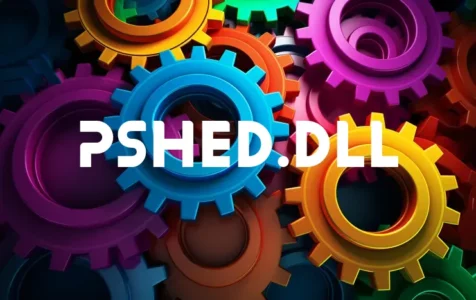Understanding PSHED.DLL and Its Issues
PSHED.DLL, short for “Platform Specific Hardware Error Driver,” is a system file used by the Windows operating system to help manage hardware errors that occur at a platform level. This file is a critical system component necessary for robust hardware error handling, and it plays a role in addressing system issues that may arise from various hardware malfunctions.
Is PSHED.DLL Safe to Run?
Yes, PSHED.DLL is a legitimate Windows system file provided by Microsoft and is safe to run. Nonetheless, the presence of errors related to this file can sometimes reflect underlying system or hardware issues.
Could PSHED.DLL Be a Virus or Malware?
The genuine PSHED.DLL file itself is not a virus or malware. However, it is not uncommon for malware to disguise itself as a legitimate system file. Users should run antivirus scans to ensure the safety of their system files. Keep your antivirus software updated to detect and quarantine any malicious files.
Common Issues Associated with PSHED.DLL
PSHED.DLL is most notably associated with the Blue Screen of Death (BSOD) error, usually demonstrated by the stop code “WHEA_UNCORRECTABLE_ERROR.” This error can be triggered due to various reasons such as hardware malfunctions, system overheating, power supply issues, or corrupted system files.
Expert Tip: For smoother PC performance, consider using a PC optimization tool. It handles junk files, incorrect settings, and harmful apps. Make sure it's right for your system, and always check the EULA and Privacy Policy.
Special offer. About Outbyte, uninstall instructions, EULA, Privacy Policy.
Users often experience such BSODs during periods of high system activity, such as gaming or multitasking. In some cases, the BSODs may occur randomly, even when the computer is idle.
How to Fix Issues with PSHED.DLL
Before attempting any fixes, it’s critical to back up your data. You might also want to use data recovery software if you’re facing potential data loss.
Update Device Drivers: Outdated or faulty drivers are frequent culprits of BSODs. Ensure that all hardware drivers, particularly those for your graphics card and motherboard, are up to date.
Run System File Checker (SFC):
To run an SFC scan, follow these steps:
1. Open the Command Prompt as an administrator.
2. Type `sfc /scannow` and press Enter.
3. Allow the scan to complete and fix any corrupt files it finds.
Run CHKDSK Command:
CHKDSK can locate and repair bad sectors on your hard drive.
1. Open Command Prompt as an administrator.
2. Type `chkdsk /r` and press Enter.
3. Follow the prompts to schedule and run the disk check.
BIOS Update:
In some cases, updating the BIOS can resolve hardware-related BSODs. Check your motherboard’s manufacturer website for any available BIOS updates.
System Restore:
If you started experiencing issues after a recent change in your system, performing a system restore can roll back these changes and potentially fix the problem.
1. Type “create a restore point” in Windows search and select the corresponding result.
2. Go to the System Protection tab and click on “System Restore.”
3. Follow the prompts to select a restore point prior to when the issues started.
Reset Windows: As a last resort, you could reset Windows while keeping your files. Go to Settings в†’ Update & Security в†’ Recovery and choose to reset your PC.
Hardware Diagnostic:
If you suspect hardware failure, utilities like Intel Processor Diagnostic Tool or MemTest86 can help diagnose issues with the processor or memory, respectively.
Remember that these solutions might not be effective if your BSODs are due to physical hardware damage. In that case, consider professional help or replacing the failing hardware.
User experiences from community discussions like those found on the Microsoft Answers forums, Techguy, and EVGA forums often provide a wealth of shared solutions and insights into similar problems. Engaging in these discussions can both contribute to and benefit from a collective troubleshooting effort.
Though impactful system files like PSHED.DLL usually perform without issue, when problems arise, they can be disconcerting. However, by following streamlined troubleshooting steps, many of these issues can be resolved systematically, ensuring that your system returns to normal functioning.
